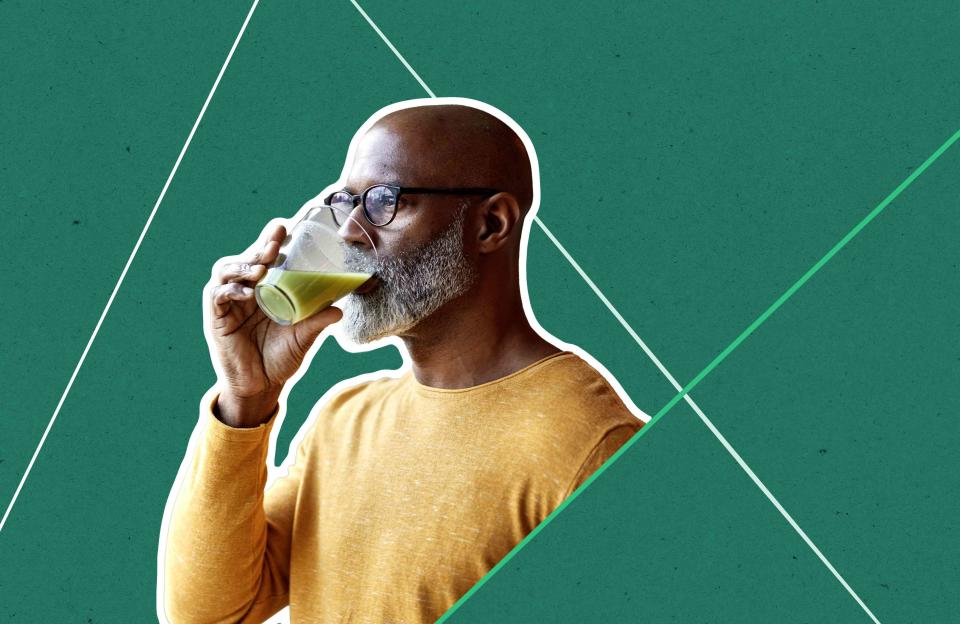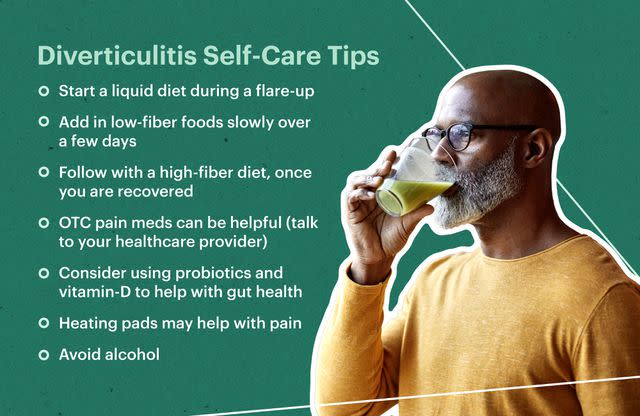
Photo Composite by Amelia Manley for Verywell Health; Getty Images
Medically reviewed by Jay N. Yepuri, MD, MS
Diverticular disease is a condition that causes pouches (diverticula) in the lining of the colon. These are common as people reach age 50 and usually don’t cause symptoms. However, the pouches can become inflamed (which is called diverticulitis) and cause abdominal pain, constipation (or sometimes diarrhea), and, in some cases, bleeding.
Most cases of diverticulitis are uncomplicated and can be treated at home with a change in diet and Tylenol (acetaminophen). This article will discuss some of the ways that diverticulitis can be treated at home with self-care under the guidance of a healthcare provider.

Photo Composite by Amelia Manley for Verywell Health; Getty Images
Can You Treat Diverticulitis at Home?
In 80% of cases, diverticulitis is considered uncomplicated. This means that there are no complications such as an abscess (pocket of pus) or a fistula (an abnormal connection between two organs).
Uncomplicated diverticulitis can generally be treated outside of a hospital setting, such as at home.
Diverticulitis may cause symptoms of abdominal pain, bloating, constipation and/or diarrhea, and, uncommonly, lower digestive bleeding. It’s important to see a healthcare provider to get a diagnosis. Seek care right away for severe abdominal pain, especially if you also experience vomiting, bleeding, and fainting or dizziness.
Liquid Diet
It’s generally advised that people adopt a liquid diet while having symptoms from diverticulitis since complications could occur with a regular diet.
Some studies show a liquid diet may not be necessary. One study of people with diverticulitis who ate a regular, solid diet in the hospital noted that the rate of complications in these people wasn’t any higher than those on a liquid diet.
However, some people might feel better while on a liquid diet. People who are experiencing diverticulitis should speak to a healthcare provider about adopting a liquid diet and how long it should be continued.
Adjusting Your Fiber Intake
If a liquid diet is recommended, it will be used until symptoms start to get better. This might be after about three to five days.
Diet is challenging because it is extremely personal. What people eat from day to day is influenced not only by health conditions but also preferences, culture, and religious practices.
People who live with diverticular disease should ask a healthcare provider to recommend a helpful diet. It’s important to let healthcare providers know about all the ways diet is important to quality of life.
Low-Fiber Diet
Low-fiber foods might be added back into the diet first. It’s usually recommended that these foods are started slowly added in over a few days. If symptoms don’t continue to improve or they get worse, check back in with a healthcare provider.
Lower-fiber foods, in general, include meats, well-cooked vegetables, canned or cooked fruits, eggs, dairy products, white bread, rice, and pasta. Paying attention to how certain foods affect symptoms is important when adding them back into the diet.
Related:Overview of the Diverticulitis Diet
High-Fiber Diet
Once recovered from diverticulitis, you may need to be on a high-fiber diet. Adding fiber to the diet can lead to an increase in bloating and gas in some people. For those who didn’t follow a high-fiber diet before having diverticulitis, adding fiber to meals slowly may help.
The Department of Agriculture recommends that adults over age 50 years eat about 28 grams (g) of fiber a day. Many adults find this goal difficult. Foods high in fiber include whole fruits and vegetables, nuts, seeds, and whole wheat breads, pastas, and cereals.
It’s recommended that people get fiber from foods as much as they can. However, talk to a healthcare provider about a fiber supplement if it’s not possible to eat a high-fiber diet.
Related:High-Fiber Diet for Diverticulosis
Over-the-Counter (OTC) Medications
Diverticulitis often causes pain. Tylenol may be recommended for pain relief when treating diverticulitis at home. Other pain medications may be prescribed by a healthcare provider or given by intravenous line (IV) if there’s a need to be treated in the hospital.
The role of nonsteroidal anti-inflammatory drugs (NSAIDs) such as Advil or Motrin (ibuprofen) is less clear. NSAIDs can cause digestive problems and a risk of bleeding in some people.
The research on using NSAIDs for diverticulitis is mixed. One meta-analysis has shown a link between NSAID use and risk of complications in diverticular disease. Another smaller study showed that people who took NSAIDs for a short period of time didn’t have any long-term problems.
It’s important to talk about OTC options for pain relief with a healthcare provider. Ask for clear directions on whether acetaminophen and/or ibuprofen should be used.
Related:Is Diverticulitis Pain Normal?
Probiotics
Probiotics are the good bacteria that are needed in the gut. They can be found in some foods and are also available as supplements.
There is little evidence that probiotics are helpful for a flare-up of diverticulitis. Research studies use different types and dosages of probiotics, making it difficult to compare them. Probiotics might be helpful for long-term gut health, but you should ask a healthcare provider before taking them.
Related:Taking Probiotics for Diverticulitis
Vitamin D
Some research has explored whether vitamin D has a role in diverticulitis. One study showed that diverticulitis is more common in the winter when there is less sunlight. The body naturally produces vitamin D when the skin is exposed to sunlight.
Vitamin D is important to gut health and overall health. However, there’s no good evidence for it having a role in acute diverticulitis. It may be helpful in preventing diverticulitis, but this has not been confirmed scientifically.
Getting enough vitamin D is important for everyone. For those who have a concern about their vitamin D levels, talking to a healthcare provider about testing may be helpful.
Related:Home Remedies for Diverticulitis
Apply Heat
Heat is often used to soothe stomach pain from a variety of causes. Some people find using a heating pad on the abdomen helps with diverticular pain. There’s no evidence behind using heat for diverticulitis, but it’s generally a simple and noninvasive method to try.
It’s important to be careful with heat and to use a heating pad according to the instructions. Sleeping with a heating pad is not recommended because it could lead to skin irritation or other problems.
Related:The 10 Best Heating Pads of 2023
Exercise
Exercise may be helpful in preventing diverticulitis. A study that was done over a period of 18 years showed that men who exercised vigorously had a lower risk of diverticulitis and bleeding. When citing research or health authorities, the terms for sex or gender from the source are used.
There aren’t any guidelines as to how much physical activity would be helpful for avoiding a flare-up of diverticulitis. However, research shows that people who didn’t smoke, ate 23 grams of fiber a day, had a normal body mass index (BMI), ate an average amount of red meat, and got about two hours of exercise a week had a lower risk of diverticular disease.
Meeting all those goals is not easy. The Centers for Disease Control and Prevention (CDC) recommends 30 minutes of exercise a day, five days a week, for 150 minutes in total. This is considered moderate activity, which raises the heart rate to 55% to 70% of your maximum heart rate.
Rest usually is recommended during an acute flare-up of diverticulitis. After recovering, talk to a healthcare provider about increasing your activity level.
Related:A New Study Suggests Doubling Your Exercise Time to Live Longer. But Do You Have to?
Drink Less Alcohol
Drinking alcohol should be avoided during a flare-up of diverticulitis. Alcohol use disorder may also increase the risk of diverticulitis.
It’s not known how drinking moderate amounts of alcohol affects the risk of diverticular disease or diverticulitis. The CDC recommends that men have two or fewer drinks and that women have one drink or less a day. In short, drinking less alcohol is better than drinking more.
Related:Is It Safe to Mix Painkillers and Alcohol?
When to Seek Professional Care
People who are having a diverticulitis flare-up should seek care from a healthcare provider. If you've had diverticulitis before, you may recognize the signs and symptoms. It’s still important to get diagnosed and treated by a trusted professional.
Symptoms of bloating, pain, constipation, and/or diarrhea are common in diverticulitis. Having these symptoms is a reason to see a healthcare provider. Acute pain (pain that's sudden and sharp but will be relieved with treatment) or bleeding from the rectum are reasons to seek care right away.
Make a follow-up appointment with a healthcare provider about a week after symptoms start. If symptoms get worse or don’t get better a few days after treatment starts, you should call your healthcare provider again.
Summary
Diverticular disease is common but doesn’t always lead to diverticulitis. Diverticulitis can usually be treated at home (not in the hospital), and complications are uncommon. It’s usually recommended that people follow a liquid or low-fiber diet for a few days and use Tylenol for pain relief. A heating pad may also help with pain relief.
There is less evidence that exercise, vitamin D, or probiotics might be helpful. It’s important to talk with a healthcare provider about how to make lifestyle changes to avoid flare-ups of diverticulitis.
https://ift.tt/3Nmetil
Tidak ada komentar:
Posting Komentar